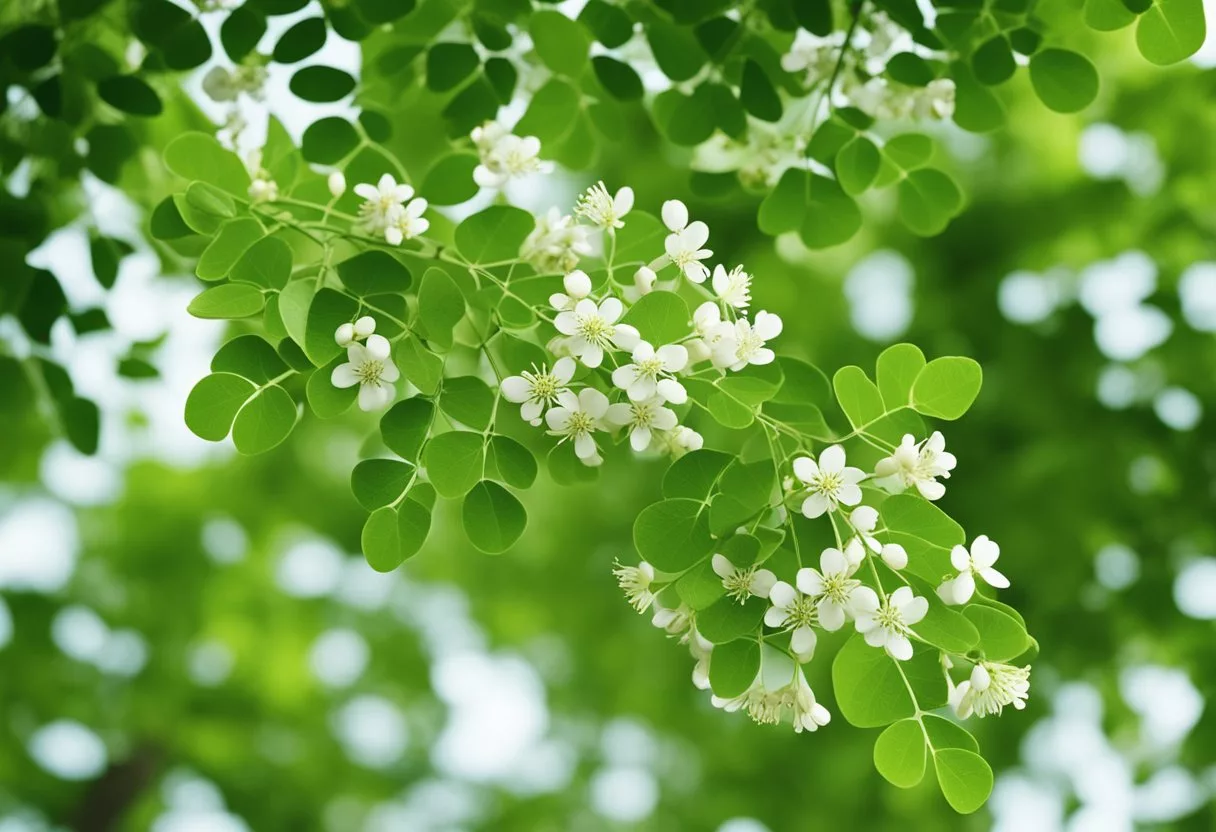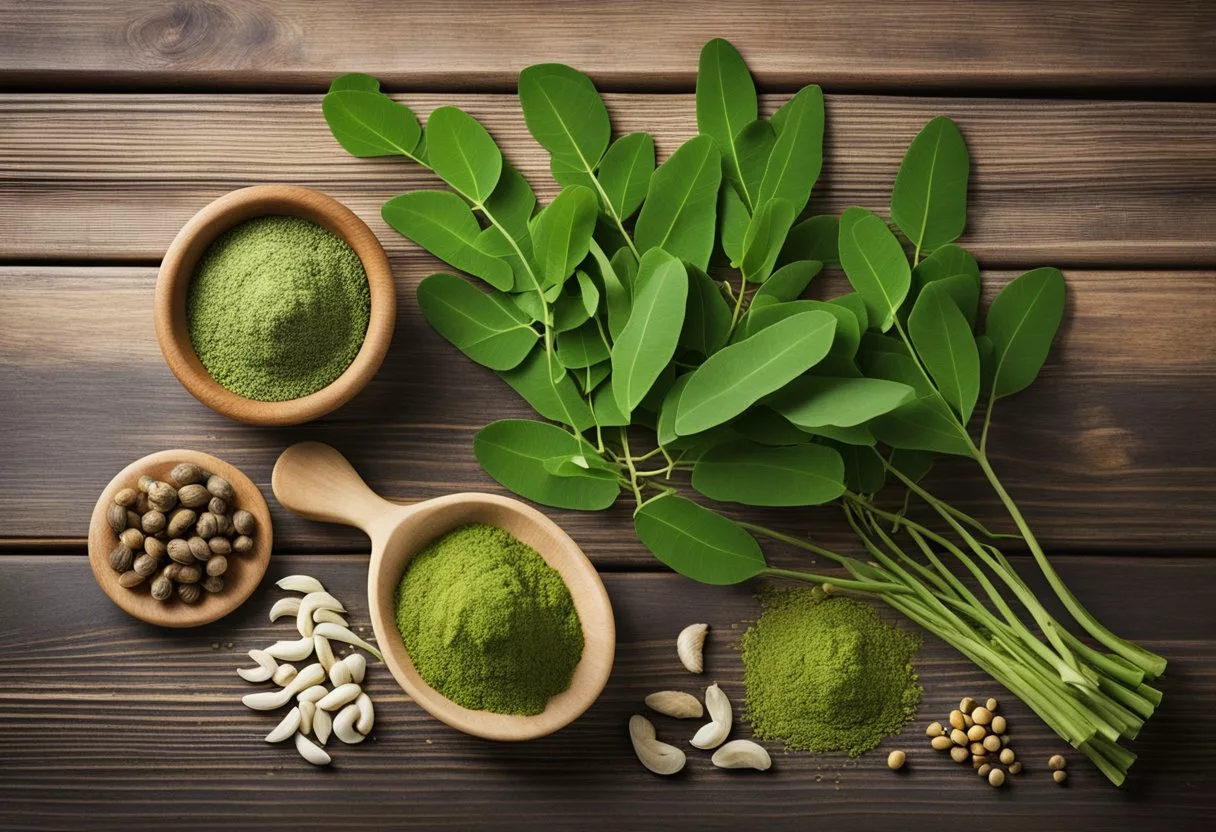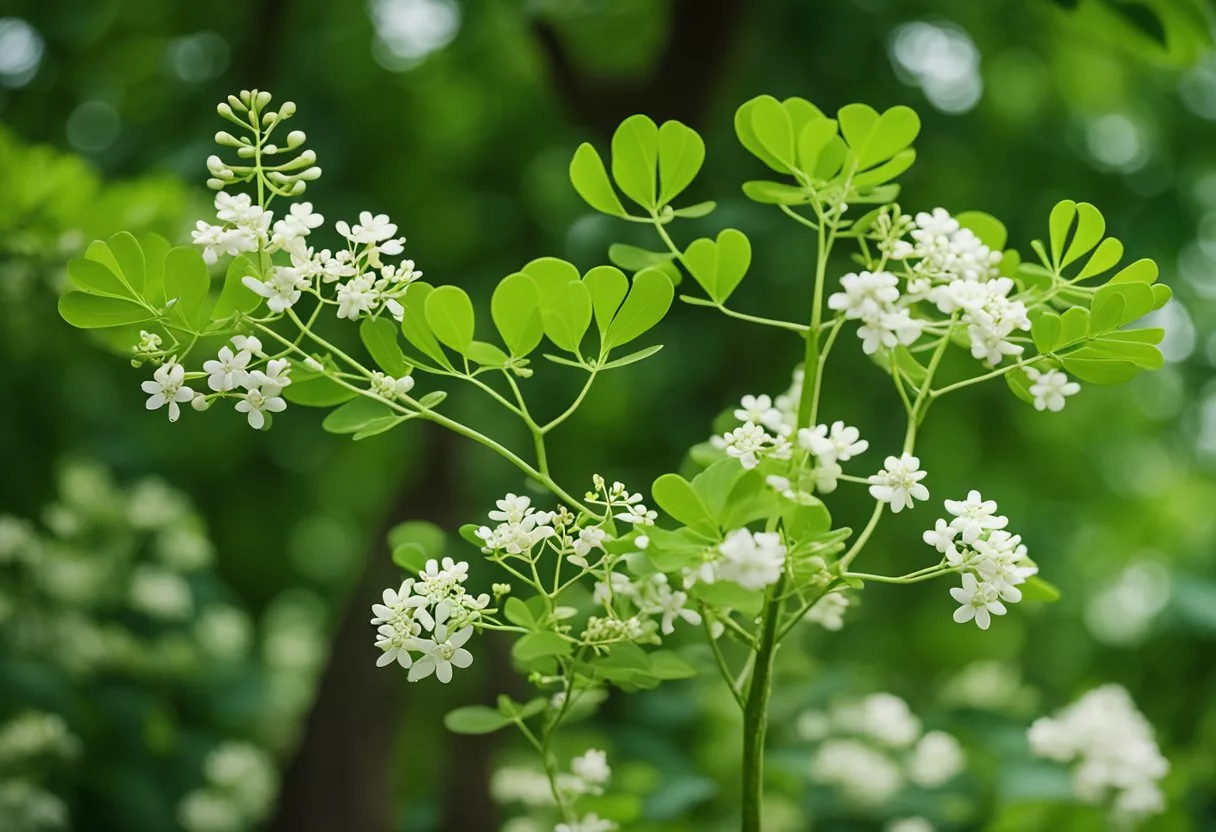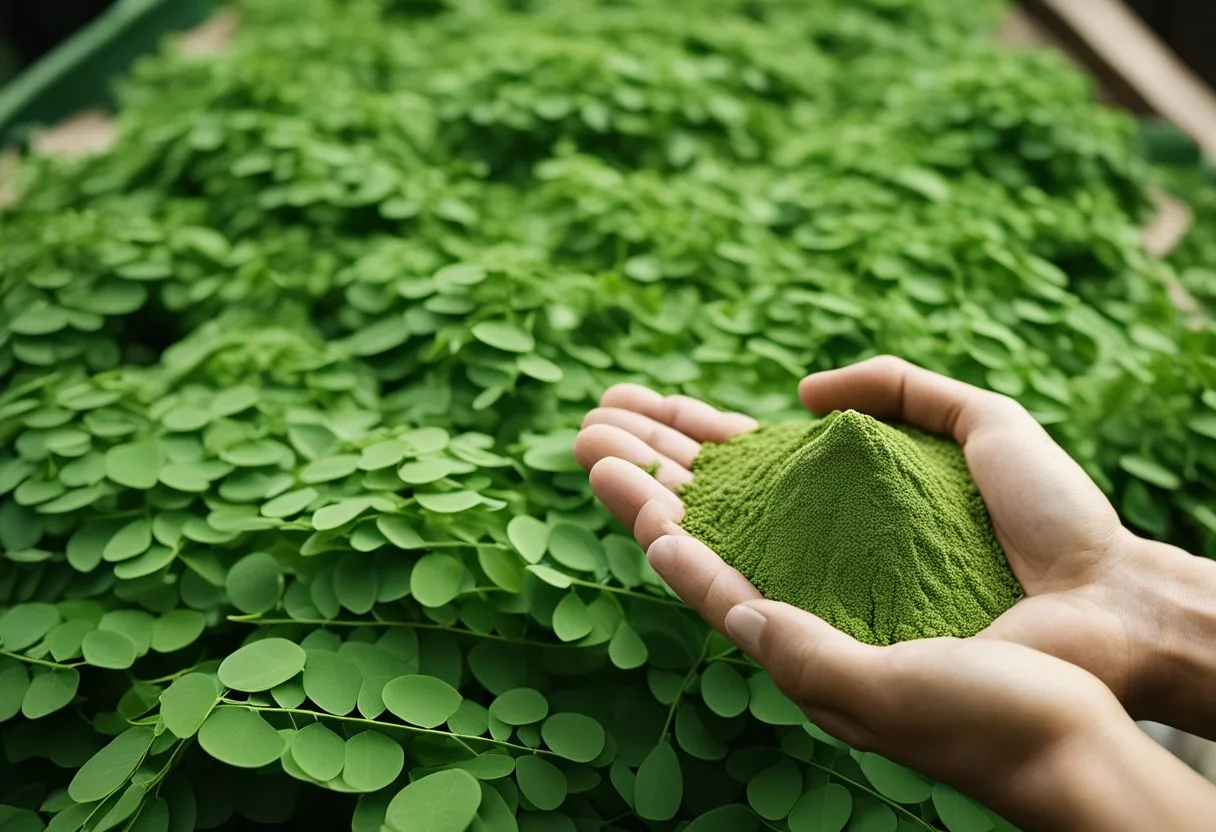Moringa is a powerful plant with a rich nutritional profile. Packed with vitamins, minerals, and antioxidants, it offers numerous health benefits, making it a valuable addition to your diet. Studies suggest that moringa may help lower blood sugar levels, reduce cholesterol, and minimize inflammation, contributing to overall well-being.

Traditionally used in medicine, moringa has shown potential in easing conditions like diabetes, arthritis, and even certain cancers. The leaves, pods, and seeds of the moringa tree are all edible and widely available, making it easy to incorporate into various meals and supplements. With its antioxidant and anti-inflammatory properties, it supports overall health and fights oxidative stress.
Despite its many benefits, it’s important to use moringa safely and be aware of any potential side effects. Consulting a healthcare professional before adding it to your routine can ensure safe consumption. Whether in powder, tea, or raw form, moringa can be a versatile and beneficial addition to your daily diet.
Key Takeaways
- Moringa is rich in vitamins, minerals, and antioxidants.
- It may help lower blood sugar, cholesterol, and inflammation.
- Ensure safe use by consulting a healthcare professional before adding moringa to your diet.
Nutritional Profile of Moringa

Moringa is packed with vital nutrients. It contains high levels of essential vitamins, minerals, and proteins.
Vitamins and Minerals
Moringa is rich in several vitamins and minerals that provide numerous health benefits. It has an impressive amount of vitamin A, which is crucial for eye health, and boasts 10 times the vitamin A of carrots. Vitamin C content is equally notable; moringa has 12 times more vitamin C than oranges, making it a robust support for the immune system.
The mineral content is also remarkable. Moringa contains 17 times more calcium than milk, essential for bone health, and 15 times more potassium than bananas, which helps regulate blood pressure. iron is another critical nutrient found abundantly in moringa, with 25 times more iron than spinach, supporting healthy blood cells.
Amino Acids and Proteins
Moringa is also a powerful source of protein and amino acids, vital for body function and muscle repair. A typical serving of moringa powder, about 10 grams, provides 2.74 grams of protein. This protein content can be especially beneficial for those on plant-based diets.
The amino acids found in moringa help build and repair tissues. It contains all nine essential amino acids, making it a complete protein source. This includes lysine, needed for collagen formation, and leucine, which aids in muscle repair. These essential nutrients make moringa a valuable addition to daily nutrition.
Health Benefits

Moringa has numerous health benefits, including antioxidant effects, anti-inflammatory properties, and blood sugar regulation. It can also help improve blood pressure, support cancer prevention, and enhance skin and hair care. Additionally, moringa can aid digestive health, support weight management, and boost mental well-being.
Antioxidant Effects
Moringa is rich in antioxidants, which help combat oxidative stress and free radicals. Moringa leaves contain high amounts of vitamin C, vitamin A, and compounds such as quercetin. These antioxidants can protect cells from damage, promote overall health, and may help reduce the risk of chronic diseases. Consuming moringa as part of a balanced diet supports the body’s natural defenses against aging and environmental stressors.
Anti-Inflammatory Effects
Moringa has strong anti-inflammatory properties, which can help reduce inflammation in the body. Chronic inflammation is linked to various health problems, including heart disease and arthritis. The leaves, seeds, and pods of moringa contain several natural compounds that inhibit inflammatory markers. This can help manage symptoms of conditions such as rheumatoid arthritis and may also aid in recovery from injuries and surgeries by lowering swelling and pain.
Regulating Blood Sugar
Moringa has shown potential in regulating blood sugar levels. Studies indicate that compounds found in moringa, such as isothiocyanates, can help lower blood sugar levels. This makes it beneficial for people with diabetes or those at risk of developing the condition. By improving insulin sensitivity, moringa can help maintain healthy blood glucose levels and reduce the occurrence of blood sugar spikes.
Improving Blood Pressure and Circulation
Moringa may help to improve blood pressure and circulation. The plant contains compounds such as nitrates that can help widen blood vessels, promoting better blood flow. Additionally, its high potassium content supports heart health by balancing sodium levels in the body. Regular consumption of moringa might help lower high blood pressure, reducing the risk of heart diseases and improving overall cardiovascular health.
Cancer Prevention and Treatment
There is emerging evidence that moringa may have cancer-fighting properties. Some studies suggest that extracts from moringa can inhibit the growth of cancer cells and induce cell death in certain types of cancers. The presence of compounds like niazimicin further supports its potential in cancer prevention. While more research is needed, including moringa in the diet could be a beneficial addition to a cancer-preventative lifestyle.
Skin and Hair Care
Moringa can enhance skin and hair health due to its rich nutrient profile. The high vitamin C content aids in collagen production, which helps maintain skin elasticity and prevents signs of aging. Additionally, moringa’s anti-inflammatory and antioxidant properties can soothe skin conditions such as acne or eczema. When used in hair care, it can promote hair growth and strength, reducing breakage and scalp issues.
Digestive Health
Moringa supports digestive health by promoting regular bowel movements and reducing inflammation in the digestive tract. Its high fiber content aids in digestion and prevents constipation. Additionally, moringa’s anti-inflammatory compounds can help alleviate symptoms of inflammatory bowel diseases. Including moringa in one’s diet can create a healthier gut environment, support nutrient absorption, and maintain a balanced microbiome.
Weight Management
Incorporating moringa into a diet may assist with weight management. The plant has properties that can boost metabolism and reduce fat accumulation. Moringa leaves provide a nutrient-dense, low-calorie option that can support satiety and reduce overall calorie intake. Regular consumption can also help stabilize blood sugar levels, reducing cravings and preventing overeating.
Mental Health
Moringa has the potential to support mental health by improving mood and reducing symptoms of depression. It contains compounds that may enhance brain health, such as antioxidants and anti-inflammatory agents. Additionally, moringa is rich in essential nutrients like iron, which is necessary for brain function and can help reduce fatigue and improve overall mood. Regular intake may contribute to better mental clarity and emotional resilience.
Moringa in Traditional and Modern Medicine

Moringa has been used in both ancient and contemporary healing practices. Its different parts are valued for treating diseases and providing various medicinal benefits.
Treatment of Diseases
Traditionally, moringa has been used to address various ailments. For instance, it has been employed in curing wounds, pain, ulcers, liver disease, heart disease, and inflammation. Moringa is often referred to as the “tree of life” due to its diverse health benefits.
In recent studies, moringa has shown promise in managing blood glucose levels, which could aid in diabetes control. Research on mice has revealed that moringa concentrate can improve glucose tolerance and reduce weight gain even on a high-fat diet. This indicates its potential in preventing fatty liver disease and enhancing insulin signaling.
Medicinal Properties of Different Moringa Parts
Different parts of the moringa plant, such as leaves, seeds, and roots, possess unique medicinal properties. The leaves are rich in vitamins A, C, and E, and they have strong antioxidant properties. They are used to boost immunity and improve skin health.
The seeds of the moringa plant are known for their antimicrobial effects. They are utilized to purify water and treat bacterial infections. Additionally, moringa roots have anti-inflammatory compounds, which play a significant role in reducing pain and swelling.
These specific components make moringa a valuable plant in both traditional and modern medicine, offering numerous health benefits across various applications.
Potential Side Effects and Safety

Moringa is often praised for its health benefits, but it is important to also understand the potential side effects and safety concerns. Knowing the risks and interactions with medications can help ensure safe usage.
General Safety and Precautions
Moringa is generally considered safe for consumption, but it may cause side effects in some individuals. The most common issues are diarrhea and stomach upset. High doses can act as a laxative, leading to further gastrointestinal discomfort. Pregnant women should avoid moringa due to its potential to induce uterine contractions.
Liver health is another area of concern. Some studies suggest that moringa might have protective effects on the liver, but overconsumption could lead to liver damage. To minimize risks, it is recommended to follow proper dosage guidelines and consult a healthcare provider.
Interactions with Medications
Moringa can interact with various medications. It might alter the effectiveness of drugs used to manage diabetes, such as insulin, because it has blood glucose-lowering properties. This can pose risks, leading to hypoglycemia if not monitored closely.
Additionally, moringa may interfere with medications metabolized by the liver. This includes certain cholesterol-lowering drugs and antiretroviral drugs. It might also have an impact on blood pressure medication, potentially enhancing their effects and causing dangerously low blood pressure.
Due to these interactions, it is crucial to consult a doctor before adding moringa to your diet, especially if you are on any prescribed medications. They can provide guidance on safe usage and proper monitoring.
Sourcing and Consumption

Moringa can be consumed in various forms such as powder, tea, oil, and supplements. It is vital to understand the optimal dosage and methods of consumption, as well as how to choose high-quality moringa products.
Forms of Moringa
Moringa is available in several forms, each suited for different uses. Moringa powder is made from dried moringa leaves and is commonly added to smoothies, soups, and teas. Moringa tea involves steeping dried moringa leaves in hot water. Moringa oil is extracted from moringa seeds and can be used in cooking or skincare. Supplements are available as capsules or tablets, providing a convenient way to ingest moringa’s nutrients. Fresh leaves and seed pods from the moringa tree can be used in cooking as well.
Optimal Dosage and Consumption Methods
The optimal dosage of moringa varies depending on its form and the individual’s needs. For moringa powder, 1-2 teaspoons per day are typically recommended. When using moringa leaf powder in cooking or smoothies, it’s important to start with a lower dose and gradually increase it. For moringa tea, one cup per day is a common recommendation. Moringa supplements usually come with dosage instructions on the packaging, often suggesting one to two capsules daily.
Eating fresh leaves and seed pods can also be effective. The leaves can be steamed or added to salads, while seed pods are often used in curries and stews. Moringa oil should be consumed sparingly due to its potency, with just a few drops needed for culinary uses or skin applications.
Guidelines for Choosing High-Quality Moringa
Choosing high-quality moringa products is crucial for getting the most benefits. Look for moringa powder that is organic and free from contaminants. It should be bright green, indicating freshness and proper drying. If selecting moringa tea, ensure the leaves are whole and not powdered or mixed with other herbs. For supplements, pick brands that are transparent about their sourcing and manufacturing processes.
When buying moringa oil, opt for cold-pressed varieties to ensure that the nutritional properties are maintained. If purchasing fresh leaves or seed pods, make sure they are sourced from reputable suppliers who practice sustainable farming methods. Always check for certifications and third-party testing to confirm the product’s quality and safety.
Research and Studies

Scientists have conducted extensive research on Moringa oleifera. They have noted its potential to combat oxidative stress and support the immune system.
Studies suggest that Moringa oleifera may help lower blood pressure and cholesterol levels. Its anti-inflammatory properties could be beneficial for conditions like arthritis and asthma.
Research has indicated that Moringa leaves contain compounds such as flavonoids and quercetin. These play a role in neutralizing harmful free radicals.
Moringa oleifera has also shown promise in diabetes management. Some studies report that it may help regulate blood sugar levels.
In the context of heart disease, Moringa might aid in preventing related complications. Animal studies suggest its extracts can reduce lipid levels.
Moringa’s antibacterial properties are another area of interest. Research highlights its effectiveness against various bacteria and pathogens.
Further investigation is needed, especially concerning its impact on cancer cells. Some studies indicate that Moringa induces cell death in cancerous cells through oxidative stress pathways.
Overall, Moringa oleifera is gaining attention for its diverse health benefits. Numerous studies provide a strong foundation, but continued research is essential to fully understand its potential. Interested readers can find more details on this scientific review.
Global Impact of Moringa

Moringa oleifera, known as the “drumstick tree,” holds significant potential to improve health and environmental conditions across the globe. Its impact is particularly notable in developing countries and for its environmental benefits.
Moringa’s Role in Developing Countries
Moringa has emerged as a crucial resource in many developing countries, particularly in India and parts of Africa. Its high nutritional value helps combat malnutrition, offering essential vitamins, minerals, and proteins. The plant is often used in nutritional supplements to support diets lacking critical nutrients.
In rural areas, Moringa is used to address health issues such as anemia, constipation, and other digestive problems. By enhancing local diets with its nutrient-rich leaves and pods, communities can improve their overall health outcomes. Additionally, the ease of cultivating Moringa in various climates makes it an accessible resource for families and farmers.
Economic benefits also arise from Moringa cultivation. Locals can generate income by selling Moringa products, which boosts local economies and creates jobs. Its versatility extends to various applications including medicinal uses and traditional remedies, further underscoring its importance in developing regions.
Environmental Benefits
The cultivation of Moringa oleifera offers substantial environmental benefits. As a fast-growing and drought-resistant tree, it improves soil quality and prevents erosion. Its deep roots help in stabilizing the soil, reducing the risk of landslides in vulnerable areas.
Moreover, Moringa trees act as carbon sinks, absorbing carbon dioxide from the atmosphere, which contributes to the fight against climate change. In regions facing food insecurity, Moringa’s resilience and adaptability to harsh climates make it an essential crop for sustainable agriculture practices.
Practices involving Moringa cultivation also promote biodiversity. The tree supports various ecosystems by providing habitat and food for different species. Its cultivation requires minimal water and fertilizers, making it an environmentally friendly and sustainable crop option.
Frequently Asked Questions
Moringa offers multiple health benefits including improved skin health, potential hair growth support, and specific advantages for sexual health. Here are answers to some common questions about moringa.
What are the health advantages of consuming moringa powder regularly?
Moringa powder is a rich source of several important nutrients. It contains high levels of vitamin C, vitamin A, calcium, and potassium. These nutrients can boost the immune system, improve bone health, and support overall wellness. Moringa is also known for its high antioxidant content, which helps combat oxidative stress.
Can moringa leaves improve skin health, and if so, how?
Yes, moringa leaves can improve skin health. They contain vitamins A and C, which are vital for collagen production and skin repair. Additionally, the antioxidants in moringa may help protect the skin from damage caused by free radicals, potentially making the skin look healthier and more radiant.
What potential benefits does moringa have for hair growth and maintenance?
Moringa is rich in vitamins and minerals, such as vitamin E and B vitamins, which are essential for hair health. These nutrients can promote hair growth and reduce hair loss. The high protein content in moringa also helps in strengthening hair strands, contributing to overall hair maintenance.
Are there specific sexual health benefits associated with moringa seeds?
Moringa seeds have been suggested to improve sexual health. They contain compounds that may enhance libido and sexual performance. Some studies indicate that moringa seeds may help in increasing sperm count and motility in men, which can improve fertility.
How might moringa consumption differ in its effects on men and women?
Moringa consumption provides benefits to both men and women but can support different aspects of health. For men, moringa may improve sexual health and libido. For women, moringa’s high iron content can be beneficial, especially for those who experience heavy menstrual cycles, by helping in the prevention of anemia.
Are there any dietary restrictions or interactions to consider when adding moringa to your regimen?
When adding moringa to your diet, it is important to note that it may interact with certain medications. Individuals on blood pressure medications or diabetes medications should consult a doctor before use. Pregnant and breastfeeding women should also seek medical advice prior to consumption as moringa may have effects on pregnancy and milk production.